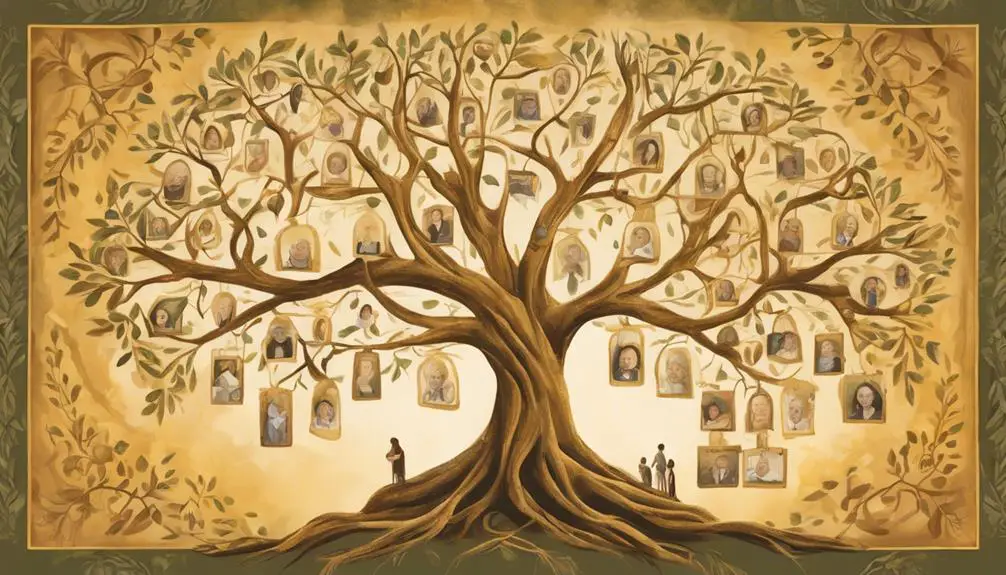Hidden within the Bible, Benjamin's blessing unfolds mysteries of legacy and faith, beckoning a deeper exploration into its timeless wisdom.

Benjamin Blessing in the Bible
As you sow, so shall you reap—a concept that beautifully ties into the story of Benjamin's blessing in the Bible.
You're about to embark on a journey through the intricate layers of Jacob's blessings, where each word and symbol weaves into the broader tapestry of familial relationships and legacies.
This exploration isn't just about understanding an ancient text; it's about uncovering how Benjamin's unique blessing influences both Christian and Jewish traditions today.
Suffice it to say, the implications of this blessing stretch far beyond its initial revelation, leaving you to ponder its significance in a modern context.
Key Takeaways
- Benjamin's blessing is rich in symbolism, predicting the future of his tribe through imagery like a ravenous wolf.
- The blessing reflects both personal destiny and the broader fate of his descendants within the biblical narrative.
- Understanding Benjamin's blessing offers insights into patriarchal values, divine prophecy, and the significance of birthright in biblical times.
- The blessing and its implications have shaped Christian and Jewish traditions, influencing religious beliefs and cultural interpretations.
The Genesis of Benjamin's Story

Benjamin's narrative begins in the Book of Genesis, where he emerges as the last-born son of Jacob and Rachel, symbolizing the culmination of a complex familial saga. His entry into the world is marked by both joy and tragedy, embodying a moment of profound transformation within his family's history. Benjamin's birth is enveloped in Rachel's sorrow, as she faces grave complications. This pivotal event occurs during a journey to Ephrath, which is now Bethlehem, highlighting the nomadic lifestyle of his ancestors and setting a dramatic backdrop for his entrance into the world.
The circumstances surrounding Benjamin's birth are fraught with emotional and physical turmoil. Rachel, long barren, had previously endured the heartache of watching her sister Leah bear sons to Jacob, her own husband. Benjamin's birth, therefore, represents not just the addition of another child to Jacob's lineage but the fulfillment of Rachel's deep yearning for motherhood. Unfortunately, this joy is short-lived, as Rachel succumbs to childbirth complications, leaving a lasting imprint on the family's narrative. Her dying wish is to name her son Ben-oni, 'son of my sorrow,' though Jacob instead names him Benjamin, 'son of the right hand,' signifying a future of favor and strength.
Understanding Jacob's Blessings

Exploring Jacob's blessings offers insight into the patriarchal values and prophetic visions that shaped the destinies of his sons, including Benjamin. Within these blessings, patriarchal dynamics and the significance of birthright play crucial roles, illuminating the social and familial structures of ancient times. Jacob's blessings, delivered as he neared the end of his life, weren't merely fatherly wishes but carried the weight of divine prophecy, influencing the future of the tribes of Israel.
The birthright significance is particularly evident in the cases of Reuben, Jacob's firstborn, who lost his preeminence, and Joseph, who received a double portion through his sons Ephraim and Manasseh. This shift underscores the fluidity and complexity of patriarchal blessings, where merit and divine favor could alter the traditional rights of primogeniture.
Understanding these dynamics sheds light on Jacob's relationship with his sons and their subsequent roles within the nation of Israel. Each blessing, tailored to the individual, revealed Jacob's perception of his sons' strengths and weaknesses, setting the stage for their future endeavors and challenges. Through this lens, one can appreciate the broader implications of Jacob's blessings on the legacy and identity of the Israelite tribes.
The Symbolism of Benjamin's Blessing

In the biblical narrative, the blessing bestowed upon Benjamin stands out for its rich symbolism, reflecting both his personal destiny and the broader fate of his tribe within the Israelite confederation. This blessing, dense with imagery and implications, offers a fascinating glimpse into tribal significance and prophetic interpretations that have captivated scholars and believers alike.
You'll find that the blessing's symbols aren't merely ornamental; they serve as a profound narrative device. They encapsulate the essence of Benjamin's tribe, predicting its future with remarkable accuracy. This tribe's portrayal as a ravenous wolf, tearing into its prey by morning and dividing the spoils by evening, isn't just vivid imagery. It's a prophetic interpretation, forecasting a warrior tribe, fierce and successful in its conquests.
This element of the blessing not only highlights the martial prowess and eventual prosperity of Benjamin's descendants but also underscores the interconnectedness of destiny within the Israelite tribes. The symbolism here is layered, each facet offering insights into the tribal dynamics, their roles within the collective Israelite identity, and the unfolding of their historical narratives.
Familial Relationships and Legacy

Delving into the familial relationships and legacy within Benjamin's narrative, we observe a complex tapestry of interactions that shape the tribe's destiny and influence its role in biblical history. The story of Benjamin and his lineage provides valuable insights into the intricacies of brotherly dynamics and inheritance disputes, which are pivotal in understanding the broader context of the tribe's place among the Israelites.
To further engage with these themes, consider the following points:
- Brotherly Dynamics: The relationship between Benjamin and his brothers, particularly Joseph, is emblematic of the deep bonds and tensions that can exist within a family. These dynamics not only affect their personal interactions but also have lasting implications for their descendants.
- Inheritance Disputes: The distribution of land and blessings among Jacob's sons triggers disputes that highlight the complexities of inheritance rights. Benjamin's portion and its implications underscore the challenges of fair division within a patriarchal society.
- Legacy Formation: The actions and decisions of Benjamin's family members contribute to the tribe's legacy, influencing how it's perceived and its role in subsequent biblical narratives.
Analyzing these aspects offers a nuanced understanding of the significance of familial relationships and legacy in Benjamin's story.
Impact on Christian and Jewish Traditions

The narrative of Benjamin significantly shapes both Christian and Jewish traditions, underscoring the profound influence of biblical figures on religious beliefs and practices. This influence extends to how these traditions understand brotherhood, loyalty, and divine providence, manifesting in cultural interpretations and fostering interfaith dialogues.
Aspect |
Christianity |
Judaism |
|---|---|---|
Scriptural Context |
Seen through the lens of redemption. |
Emphasized as part of the covenant. |
Symbolism |
Represents unity and reconciliation. |
Symbolizes endurance and loyalty. |
Modern Interpretation |
Inspires discussions on forgiveness. |
Focuses on the importance of community. |
In Christianity, Benjamin's story is often interpreted as a prefiguration of grace and reconciliation, especially within the New Testament context. This perspective enhances the narrative's relevance to Christian teachings on forgiveness and redemption. In Judaism, the emphasis is on Benjamin's role within the tribal and covenantal structures, highlighting themes of loyalty, survival, and the collective identity of the Jewish people.
These interpretations contribute to a rich tapestry of meaning, allowing both traditions to draw lessons pertinent to contemporary moral and ethical dilemmas. Moreover, by engaging with the story of Benjamin, Christian and Jewish communities can find common ground, fostering interfaith dialogues that bridge doctrinal divides and promote mutual understanding.
Frequently Asked Questions
How Has Benjamin's Story Influenced Modern Cultural Expressions, Such as Literature, Art, or Film?
You'll find Benjamin's influence pervasive in cultural depictions across literature, art, and film. These mediums often reflect themes of loyalty, struggle, and redemption, mirroring his narrative. Writers and artists draw upon his story to craft complex characters and plotlines, embedding his legacy into modern storytelling.
In cinema, his archetype influences character development, often embodying resilience and transformation. Benjamin's impact is a testament to the enduring power of storytelling in shaping cultural expressions.
Are There Any Archaeological Findings or Historical Evidence That Specifically Relate to Benjamin or His Tribe?
When exploring the existence of Benjamin's lineage and tribal artifacts, you'll find the evidence somewhat sparse. Archaeological findings specifically linked to his tribe or him aren't abundant.
However, several sites and artifacts from the general era give insight into the lives of tribes during that period. These findings, while not directly attributed to Benjamin's tribe, help scholars piece together the broader historical and cultural context in which his lineage might've existed.
How Do Different Christian Denominations Interpret Benjamin's Blessing Differently?
You'll find that Christian denominations vary in their interpretation of this blessing, with genealogical significance and ecumenical perspectives playing key roles.
Some view it as a literal lineage blessing, emphasizing historical and familial continuity. Others adopt a more spiritual or allegorical approach, seeing it as a metaphor for broader Christian virtues or values.
This diversity reflects the rich tapestry of interpretations and teachings within the wider Christian community.
In What Ways Has Benjamin's Character Been Analyzed or Interpreted in Psychological or Sociological Studies?
You're exploring how Benjamin's character has been dissected in psychological or sociological studies. Scholars often focus on his personality traits and family dynamics, offering insights into his behavior and relationships.
They analyze how these aspects impact his actions and decisions, using theories from psychology and sociology to provide a deeper understanding. This approach helps to contextualize Benjamin's role within his family and society, revealing the complexities of his character.
What Are Some of the Less Known Myths or Folk Tales Involving Benjamin From Various Cultures Around the World?
You're diving into the realm of cultural reinterpretations, exploring lesser-known myths and folk tales that have woven Benjamin's legacy into their fabric.
Across various cultures, these stories offer fresh perspectives and shed light on how Benjamin's character has been adapted and reimagined.
Conclusion
In conclusion, Benjamin's blessing within the biblical narrative reveals a rich tapestry of symbolism and significance.
You've seen how it underscores the complexities of familial bonds and legacies, and how it intricately weaves into the broader Christian and Jewish traditions.
Through an analytical lens, you've understood that these blessings aren't merely words but are reflective of deeper spiritual and cultural truths.
Thus, Benjamin's story and its blessings offer profound insights into the human condition and religious heritage.



Sign up